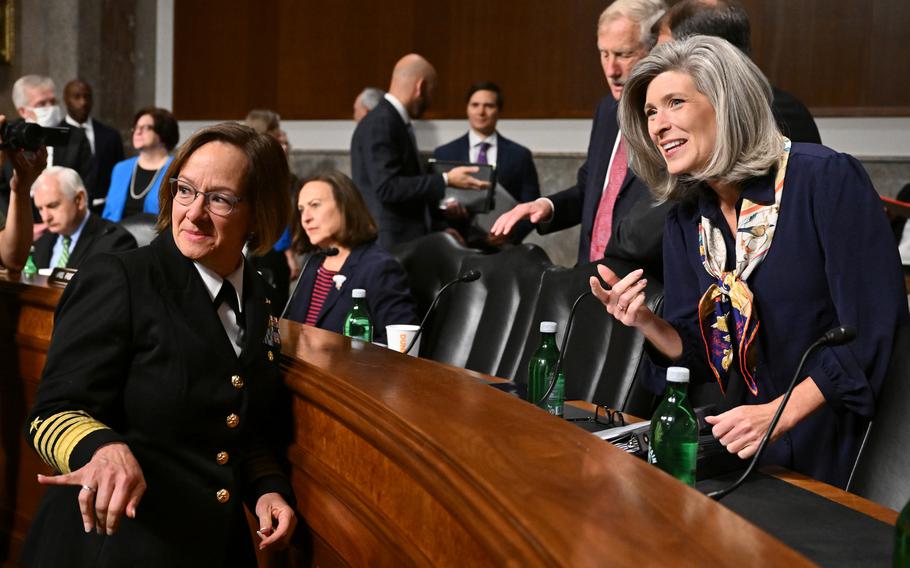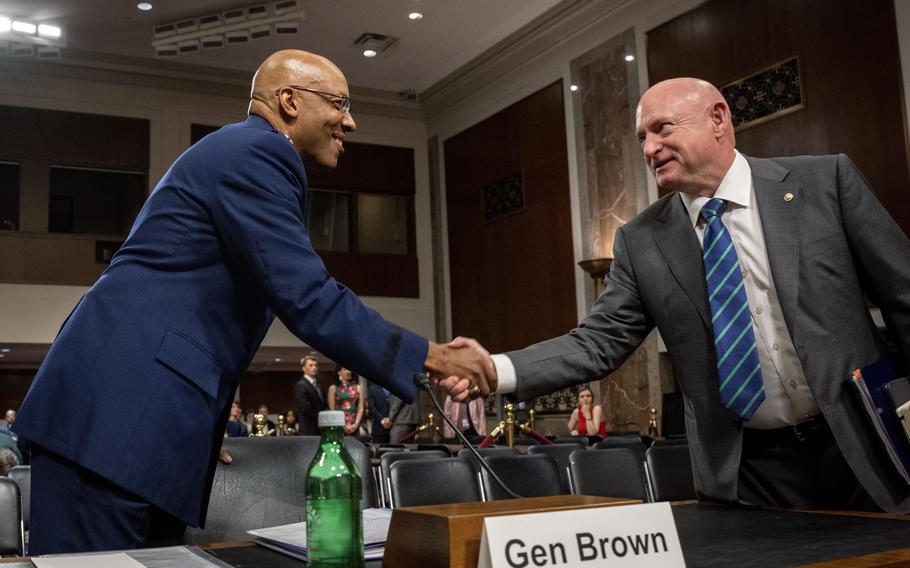
Sen. Joni Ernst (R-Iowa) chats with Adm. Lisa M. Franchetti before an Armed Services hearing to examine her nomination to be chief of naval operations on Sept. 14, 2023. (Ricky Carioti/The Washington Post)
When Sen. Dan Sullivan (R-Alaska) was asked in a July TV interview about his colleague’s decision to put a hold on hundreds of military promotions, Sullivan defended Sen. Tommy Tuberville (R-Ala.), saying it was his “right” to stall the promotions and that the impasse needed to be solved by a compromise.
But behind the scenes, the Marine Corps Reserve colonel was desperately trying to reach a solution with the senator of Alabama, who goes by “Coach” in reference to his former title at Auburn University, as he grew increasingly concerned about the blanket hold’s effect on military members and their families.
Sullivan, along with several other veterans who sit on the Armed Services Committee, finally broke Tuberville’s unprecedented blockade over a Biden administration abortion policy last week after a bipartisan pressure campaign that involved considerable political risk.
The 10-month-long saga challenged the committee with oversight over the U.S. military, which is typically more bipartisan than other Senate panels, and bitter rifts still remain over Tuberville’s standoff.
Tuberville declined an interview request for this report but told reporters last week that he had dropped most of the holds after he realized he would not be able to extract any policy victory from the situation.
“We got all we could get,” he said.
Tuberville believes he did the conference a “favor” and acted like a team player by dropping his holds and allowing Republicans to skip a tough vote, according to a Senate aide, who like others spoke on the condition of anonymity to disclose private deliberations. And the former football coach’s blockade didn’t seem to damage him significantly back home in ruby red Alabama, where criticism from President Biden and Democrats is not exactly a liability.
But the senators who fought for this resolution expressed relief that their efforts finally paid off.
“These men and women have been through 10 months of sheer hell waiting to find out if their orders were going to be approved, their nominations approved, their children not knowing where they’re going to go to school, paying out of pocket for storage, because they were in between moves,” Sen. Joni Ernst (R-Iowa), an Army combat veteran, said. “And it’s really disheartening when you’re putting those men and women [in a situation] where they want to give up on their country because their country has basically given up on them.”
The seeds of the last week’s resolution were planted over the summer, when Republican members of the Armed Services Committee quietly back-channeled with Democrats over a novel way to skirt Tuberville’s holds without permanently changing the rules of the Senate.
In August, Sens. Richard Blumenthal (D-Conn.), Lindsey O. Graham (R-S.C.) and Elizabeth Warren (D-Mass.) met with Ukrainian President Volodymyr Zelensky in Kyiv. Later, at the airport in Munich, Graham told Blumenthal he’d be open to finding some way around Tuberville’s holds, according to Blumenthal.
“There was such a strong consensus among us that something had to be done,” Blumenthal, a veteran of the Marine Corps Reserve, recalled. “Which led me to think there was really going to be some bipartisan support for this kind of approach.”
When he got back to Washington, Blumenthal asked his staff to meet with the Senate parliamentarian to try to craft a narrow way around Tuberville’s holds that would not be an official rules change. A rules change would take 67 votes instead of just 60, and Blumenthal knew that going that route would alienate senators who did not like the idea of permanently altering Senate rules.
Sen. Kyrsten Sinema (I-Ariz.) was also working on crafting a resolution with the parliamentarian at the time and floating the concept to Republicans. The eventual proposal, which was branded with the names of Sen. Jack Reed (D-R.I.), chairman of the Armed Services Committee, and Sinema, gave Republicans on the committee the leverage they needed to pressure Tuberville to back down.

Sen. Dan Sullivan (R-Alaska) walks to a policy lunch on Capitol Hill on Dec. 5, 2023. (Jabin Botsford/The Washington Post)
“What I’ve been saying is this is likely coming . . . but let’s resolve this ourselves so we don’t have to vote on that,” said Sullivan, who added that he was not involved in crafting the resolution.
Pressure was also coming from the Biden administration. The secretaries of the Navy, Air Force and Army blasted the holds in an op-ed in September, writing that Tuberville was damaging U.S. national security and putting “financial stress” on military families who in some cases needed to maintain new residences as they awaited their promotions.
Sullivan encouraged Tuberville to introduce a petition that would essentially force Senate Majority Leader Charles E. Schumer (D-N.Y.) to vote on a few high-ranking pending military nominations. Schumer had made clear that he believed Republicans must resolve the hold, and refused to move the pending military nominations one by one on the Senate floor. He argued that doing so would eat up months of floor time and set a precedent that would allow a senator to effectively shut down legislative business over nonpolitical nominees.
After the Senate approved the high-ranking nominations, former president Donald Trump praised Tuberville. “BIG WIN FOR TOMMY,” Trump wrote in a social media post in September, adding fuel to the senator’s blockade.
But then, on Oct. 7, a group of Hamas fighters attacked Israel, leaving 1,200 dead, most of them civilians.
“When we saw the invasion of Israel, it really, really drove it home with us that the world is imploding right now and we need this leadership in place to keep Americans and our own homeland safe,” said Ernst, who called the moment a “turning point” for her.
Sullivan, who is set to retire from the Marine Corps Reserve next month after 30 years of service, was fielding texts and calls from talented officers who had hit their limit, as their families were in limbo for months about whether they were moving. At the end of the year, the hundreds of nominations would go back to the committee all over again if they had not been approved, providing a do-or-die deadline for Sullivan.
In late October, while on a congressional visit to the Middle East, Sullivan spoke to a one-star Air Force general who was livid over the holds. “This one star was talking to me saying, ‘Senator, we’re now taking fire, we’re in combat again and we’re going to be deployed over the holidays,’” Sullivan recalled “’And you guys are punishing us.’”
“If they have to see the prospect of starting over again come January, I think you can see dozens leave,” the military altogether, Sullivan said. “We’re going to look back on this thinking . . . what an enormous strategic mistake.”
The GOP senators had tried for months to find a solution that would work for Tuberville — suggesting that he narrow his holds to political appointees who are involving in crafting Pentagon policy, helping him try to include a rescission of the abortion policy in the Defense Department budget and even discussing potential legal challenges he could pursue.
The senators would sometimes feel as if they had brokered a deal to end the crisis, only to realize a day or two later that Tuberville was not going to back down.
“You know, I’ve done literally everything I could think of and I can’t tell you how many times that Tommy would tell us, ‘Okay, yeah, I’m going to do that.’ And then 10 minutes later, he would change his mind,” Ernst said.
Senators also felt they had to explain to Tuberville, who has not served in the military and insisted repeatedly his holds were not damaging to the armed services, why stalling promotions affected officers so much. First, the officer whose promotion was stalled was stuck in limbo, uncertain if they needed to move their family or not and stalled at a lower pay grade that could affect their retirement earnings. Second, the officer who that person was meant to replace was in some cases unable to retire, forcing him or her to put off long-planned moves or vacations.

Gen. Charles Q. Brown Jr., left, shakes hands with Sen. Mark Kelly (D-Ariz.) before a hearing to confirm Brown as chairman of the Joint Chiefs of Staff on July 11, 2023. (Bill O’Leary/The Washington Post)
Sen. Mark Kelly (D-Ariz.), a Navy combat veteran, tried to explain this to Tuberville in multiple meetings.
“He listened, but you get into issues when somebody believes they understand the military that’s really kind of dangerous when they don’t,” Kelly said. “That’s really where you run into trouble.”
Tuberville also angered some of the Armed Services Committee’s veterans when he insisted there was “nobody more military” than him in TV appearances and even in one of the committee’s hearings. Kelly, a generally unruffled and low-key presence, snapped at Tuberville in one hearing, saying he couldn’t understand how the senator kept insisting he was the authority on the military in front of his veteran colleagues.
“It’s very annoying,” Kelly said.
The frustration eventually spilled out in a remarkable four-hour confrontation on the Senate floor in early November featuring Sullivan, Ernst, Graham and Sen. Todd C. Young (R-Ind.), another veteran.
“No matter whether you believe it or not, Senator Tuberville, this is doing great damage to our military,” Graham, an Air Force veteran, said. “I don’t say that lightly; I’ve been trying to work with you for nine months. Folks, if this keeps going, people are going to leave.”
The senators read biographies of stalled officers, compiled by Sullivan’s office, and put them up for promotion, one by one, as Tuberville continued to object. They also used the opportunity to push back on characterizations of the officers made by Tuberville or his allies.
“The idea that some of these officers are supposedly ‘woke’ or desk jockeys is ridiculous,” Sullivan said.
Tuberville felt “blindsided” by the move, according to a Senate aide.
Shortly after the confrontation, Politico reported that Tuberville’s spokesman emailed antiabortion groups in late October saying he hoped they would “make clear” that Republicans who voted to get around the holds could face primary challenges. Tuberville said the email was a “no no” and distanced himself from the sentiment, but the fracas only poured salt in the wound.
“I have some words and they’re not polite, so I’m not going to say them,” Ernst said at the time.
Both Sullivan and Ernst have faced blowback from conservatives in their state for their role in ending the standoff. The Heritage Foundation, a conservative think tank, backed Tuberville in op-eds and statements, with one of their top officials urging antiabortion conservatives to “pay close attention” to which Republicans supported him.
“I knew that I would be hit by outside organizations. So I went in with eyes wide open, but it was the right thing to do,” Ernst said. “I’m a combat veteran. I can take it.”
The criticism from Tuberville’s own party spoke louder than Schumer and the Biden administration’s critiques, and demonstrated how the hold had forced Republicans into the politically unsavory choice of supporting military families or pushing antiabortion policy.
Tuberville told reporters he was looking for a policy concession that would allow him to lift the holds but still did not choose one as his colleagues continued to fume. In mid-November, Senate Minority Leader Mitch McConnell (R-Ky.) voted against the Democrats’ resolution to go around Tuberville’s holds in the Rules Committee, saying he opposed it at “at this particular moment.” But the fact that McConnell left the door open to supporting it on the Senate floor was seen as a key turning point for senators and aides involved in the process — a sign that far more than the nine requisite Republicans might eventually back the measure.
In late November, Sullivan addressed his GOP colleagues at their weekly lunch behind closed doors, making the case that Tuberville’s hold had allowed Democrats to steal “the mantle of national security readiness” from Republicans and was “punishing and ruining the careers” of military officers and their families and fostering a “deep bitterness.”
He said he hoped that as many as 30 or 40 Republicans would vote for the Democratic proposal to get around Tuberville’s holds if Tuberville did not drop them.
“After all this time, I’m still hopeful that we can resolve this ourselves and don’t have to take this vote,” Sullivan said.
Tuberville told his colleagues he would get them out of the mess, but for days continued to suggest he would still need some sort of concession to abandon his holds.
“At the end of the day, I’m not going to be pushed and shoved and hurried on this,” Tuberville told reporters after the meeting.
Then, last Tuesday, Tuberville simply dropped them, unconditionally — except for about a dozen four-star promotions.
Schumer quickly moved the hundreds of promotions by a voice vote on the Senate floor.
No one objected.